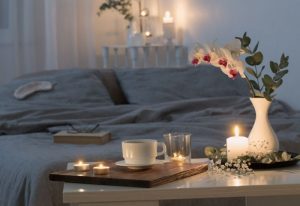Even with the huge body of solid scientific evidence linking good sleep and a healthy circadian rhythm to overall health and well-being, many people struggle to prioritize sleep in their daily routines. One of the most important things you can do for your health is to get good sleep in the new year.
With these sleep-improving strategies, not only can you enjoy more restful, restorative sleep nightly, but also build the sort of healthy foundation that helps to support long-term physical and mental health, function and well-being. That is because part of improving your sleep is also improving your diet and physical activity levels.
Good Sleep in the New Year is All About Timing
 When it comes getting better, healthier sleep, timing plays a huge role. Your circadian rhythm plays a critical part in the timing of your sleep and wake cycles. However, that isn’t the only timing aspect the circadian rhythm impacts. Mirroring the roughly 24-hour cycle of light and dark that all life on Earth evolved to, this fundamental rhythm regulates numerous processes within the body. The circadian rhythm’s influence is felt all the way down to the timing of daily activities of a single cell.
When it comes getting better, healthier sleep, timing plays a huge role. Your circadian rhythm plays a critical part in the timing of your sleep and wake cycles. However, that isn’t the only timing aspect the circadian rhythm impacts. Mirroring the roughly 24-hour cycle of light and dark that all life on Earth evolved to, this fundamental rhythm regulates numerous processes within the body. The circadian rhythm’s influence is felt all the way down to the timing of daily activities of a single cell.
When you act to promote good circadian rhythm health, you act to promote better sleep because the two are tightly linked. For better sleep, focus on timing. Bring rhythm to your days and nights. Set regular sleep and wake times, sticking to them not just during your work week, but also on days off — including vacations and holidays. Meal timing, or when you eat, also impacts your circadian rhythm and your sleep-wake cycle, so set a schedule for your meals, as well. Time your evening meal so that it falls at least three hours before bedtime, allowing for digestion time.
Light exposure is a powerful environmental cue for the circadian rhythm. To promote a healthier circadian rhythm and better sleep, be mindful of your light exposure timing throughout the day and evening. Throughout our evolution, we’ve been active during the day and have rested at night. Time your light exposure to these more natural rhythms. Morning bright natural light exposure is an important signal for your circadian rhythm, so make sure to get that exposure daily, even if you have to do it through a window.
As the light of day fades, we begin producing melatonin, a hormone that, among other things, helps us to feel sleepy. Failing to get enough bright light during the day and being over-exposed to bright artificial light in the evening can disrupt this process, interfering with sleep timing and circadian rhythm health. Avoid bright artificial lights and bright light electronics, including mobile telephones, tablets and computers, during the two to three hours before bedtime.
Eat Better Food
Studies show that ultra-processed foods, aside from being terribly bad for your health in general, are associated with poor sleep quality and shorter sleep times. Eliminate these unhealthy pseudo-foods from your diet. Focus instead on real, whole, delicious foods, choosing complex carbs and lean proteins.
Plan your meals strategically, with their purpose in mind; to fuel the activity of your day and meet your nutritional needs. Aim to consume the bulk of your calories earlier in the day – timing, again – during breakfast and lunch. Keep your evening meal light and low on carbohydrates.
Use Your Body
Getting enough physical activity each day is important to health and to sleep. In fact, according to Johns Hopkins Center for Sleep medical director Charlene Gamaldo, MD, you can see almost immediate, same-day results with 30 minutes of moderate aerobic exercise yielding better sleep that night.
Timing seems to be a factor here as well. Working out too late in the day can delay sleep in some people. For the best results, combine physical activity with morning light exposure, such as taking a brisk walk, doing some yard or garden work or doing an outdoor work-out.
Be Comfortable

Make your mind comfortable too while establishing evening habits that will signal mind and body that it is bedtime. Set up an evening routine to help ease away the stress of the day, such as a warm bath, a bit of meditation or some calming music.
Choose Better Sleep to Protect Health
Perhaps the most important of all of these sleep-improving strategies is to choose to prioritize better sleep as a means of improving and preserving your health over the long-term. It can be difficult to do in our modern society, with its round-the-clock demands, obligations and assorted social and electronic temptations. However, the evidence is clear: For you to be at your best, in both the short-term and the long-term, sleeping well is essential.







